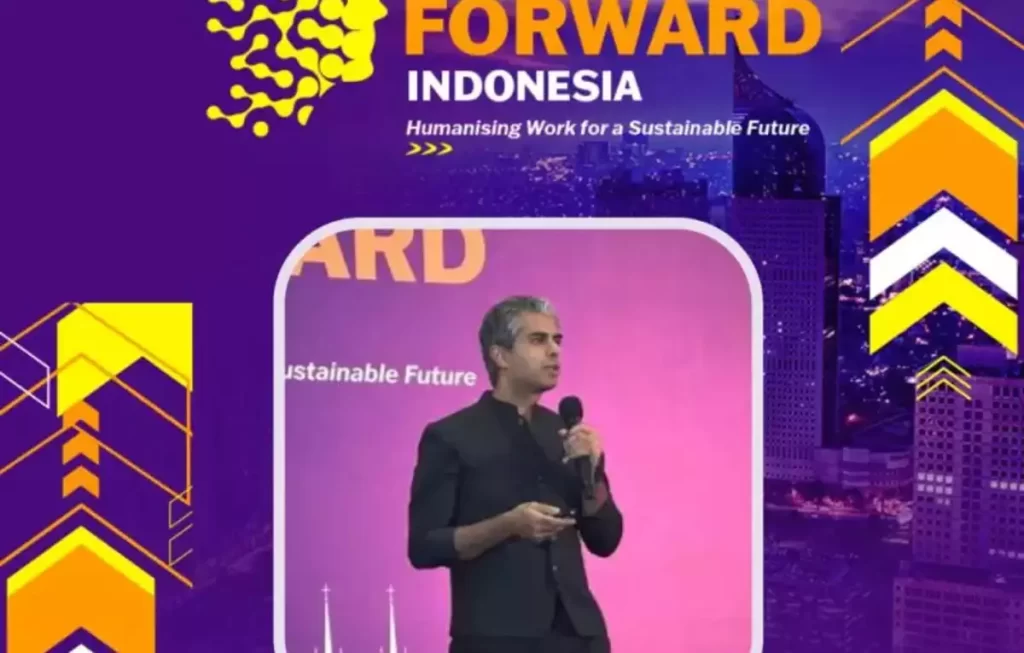
Credit: https://hrsea.economictimes.indiatimes.com/
#ETFutureForwardSEA Indonesia commenced with a stellar opening keynote session on, “Bringing back ‘humanness at the workplace’ in the era of uncertainty” by Junaid Murtaza, President Director, L’Oréal Indonesia, wherein he shared some of the best practices that business leaders can follow to keep “humanness at the workplace” intact in this new era of uncertainty.
Moving from a familiar, stable, and predictable world of work to a fast and uncertain business world has been extremely challenging for people all around the globe. While this transition has been easy for some, it often came at the expense of losing empathy and human connections at work, which has become a leading concern for employers today. To address the emerging gaps, organisations and business leaders are now fixated on bringing back ‘humanness’ at the workplace in a quest to elevate experiences and performance at work.
Against this backdrop, #ETFutureForwardSEA Indonesia commenced with a stellar opening keynote session on, “Bringing back ‘humanness at the workplace’ in the era of uncertainty” by Junaid Murtaza, President Director, L’Oréal Indonesia, wherein he shared some of the best practices that business leaders can follow to keep “humanness at the workplace” intact in this new era of uncertainty.
Here are a few key takeaways from the session:
Organisations that will create environments where listening to the employee’s voice is a priority will stay at the forefront in the future of work. Organisations that are humane will continue to thrive and grow in the future.
Adding to it, Junaid shared, “At the end of the day, behind organizations, products, services, titles… are people. What’s unique about times today is that people have access to more information and have a voice through the various communication channels. So we have to put people at the center of everything.
What can organisations do in the future to bring back ‘humanness at the workplace’?
1. Purpose
Employees now need more meaningful interactions, a strong feeling of community, and purpose-driven work.
Sharing his thoughts on building a more humane workplace culture, Junaid said, “Overall, you have to focus on creating a strong sense of collective purpose, which attracts personal interests.”
It’s high time that companies start focusing on the purpose aspect. As per research done by LinkedIn and Harvard Business Publishing Corporate Learning, 52% percent of job seekers will not accept a job offer, if they do not agree or know about the company’s values and purposes and 90% of the respondents agree that work should bring a sense of meaning to them.
L’Oréal, for instance, aims to “create the beauty that moves the world”. It’s a purpose where it acknowledges the essentiality of beauty and utilizes its power to—among others—preserve the planet’s beauty, support diversity and inclusivity, and bring personalised beauty experienced through technology. Every leader, employee, business partner work hand-in-hand to achieve this goal.
2. Lead your team skilfully
Empathy promotes healthy interpersonal interactions, a great workplace culture, and productive results. Leaders are truly empathetic when they can place themselves in the position of one of their team members, recognise the suffering and stress they are experiencing, and prioritise that person’s well-being over their own.
Junaid shared, “For me, every leader in an organisation is an HR person. We need to start breaking barriers because at the end of the day, we all are dealing with people, hence, Leadership is HR, HR is leadership. We must have compassion, empathy, and humility.”
Fundamentally not a lot of us are focusing enough on how to train people to give feedback and receive feedback. As a leader, it’s extremely important to understand the perspective of how you can add value and ask your people, ‘how can I help you achieve your goals? How can I help you do better?’ Not ‘What can you do for me? What can you do for the organisation?’
Through initiatives like Pulse survey and Connect culture, L’Oreal offers platforms for its leaders and employees to talk transparently about their hopes and concerns for themselves or the company. A new initiative in Indonesia called Limitless Leaders Club also allow proactive sharing session by leaders to create new leaders from within.
3. Creating a culture of psychological safety
Psychological safety is fundamental and paramount. If employees do not feel safe, especially around the leaders, they will not share what problems they have, which can lead to low productivity levels and dissatisfaction at work.
“The burden of leadership historically has always been that leaders must have every answer, they cannot make a mistake, and that’s a big burden to bear. Leader should be brave in bringing their authentic and whole self to work.” shared Junaid.
Leaders should also focus on creating a culture of psychological safety in the workplace and amplifying human interaction in order to create a more humanising workplace. Meetings are the most important aspect in terms of humanising interactions. Meetings should be an interaction where everyone can share the problems they’re struggling with, and what they can get help with. With L’Oréal’s Simplicity 2 initiative, for example, there is no meeting allowed on Monday before noon, making more efficient meetings (say, “45’ is the new 60’”), and decline meetings outside of working hours.
4. Taking a personalised approach
It’s crucial to have people-centric policies that create an interactive and flexible work culture. Everyone is unique with their objectives, goals, and priorities.
People must be given options to choose or to use the benefits that fit their needs. It’s important to recognise the different needs of different people and acknowledge them. L’Oréal has MyFlex, an additional benefit that employees can use for various purposes according to their liking. While most companies are fully back to working 5 days at the office, L’Oréal keeps 2 days of flexible working.
To continue with flexibility, organisations must enable the value addition that technology has brought, it’s not about replacement but it is about augmentation, of how we can be more efficient, better, and faster together.
In conclusion, if we want to become more human organisations, we must engage with our people and be available for them in every way possible.
References: https://hrsea.economictimes.indiatimes.com/news/industry/bringing-back-humanness-at-the-workplace-in-the-era-of-uncertainty/101282427

